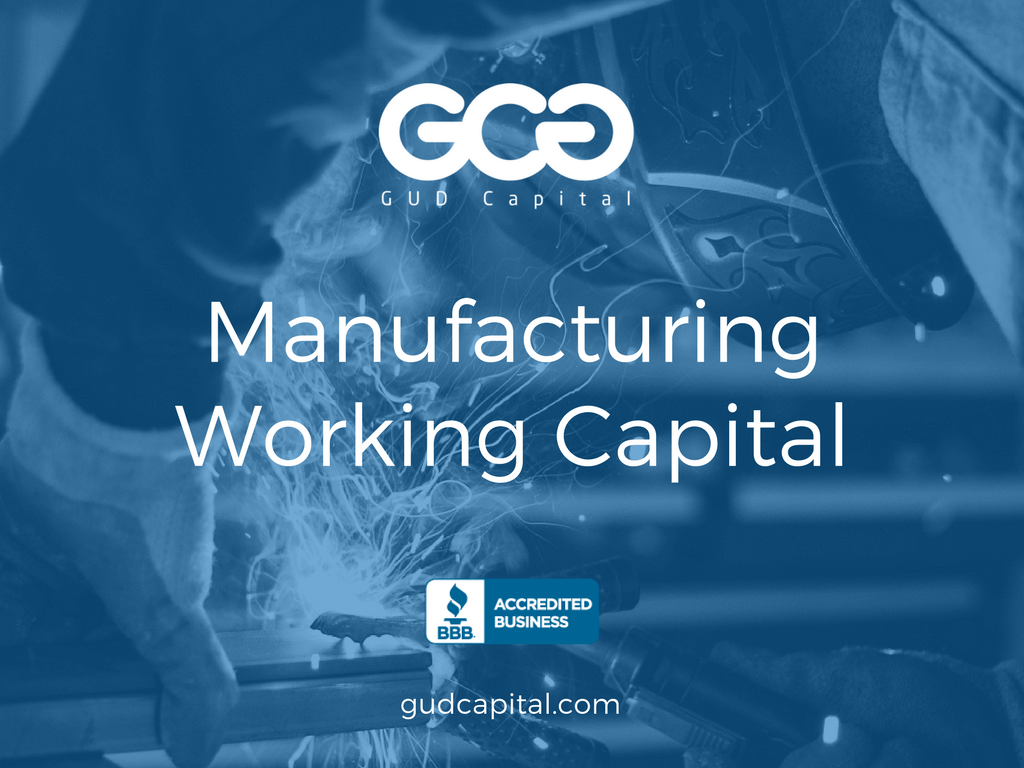Manufacturing Operating Capital
Today, Manufacturing is not like it has ever been before—undergoing the industry’s most significant change in more than 100 years. There are no longer domestic jobs in many countries with globalization, offshoring may be turning back to nearshoring, and what threatens to replace more workers every day is automation. How we build and deliver our goods and products that sustain our economies, and our everyday lives will never be the same—we are in the middle of another industrial revolution. Products are produced faster and with higher consistency, are increasingly refined and have a higher value to consumers as a result of industry changes. Thus the industrial revolution we are currently in is powered by advancements that include smart manufacturing, artificial intelligence, IoT (The Internet of Things), and a focus on sustainability.
Therefore, we are seeing new tools being utilized that are allowing companies to create and test situations in the virtual world, prompting the design process and the assembly line before a product is even built. Having the simulated product-creation phase aids in cutting down on manufacturing time and ensuring the manufacturing process delivers what companies intended to create. For example, at the tech company known as Flex, augmented reality is being used for remote assistance allowing for people in different locations around the world to communicate and connect in a live view and troubleshoot together. This technology allows for an engineer in the U.S. to consult with an engineer in China on a technical issue and receive feedback in real time; this is achieved by the engineers wearing Augmented Reality (AR) glasses, accelerating problem-solving and significantly reducing travel costs.
Also making an impact on how we manufacture today is 3-D printing, which permits for the seamless creation of tangible products using a single machine. Preparing for fundamental change, it gives the engineer a lot more possibilities for how they design apart. Further, if you needed a specific product that would typically require six pieces, 3-D printing would allow you to achieve the same thing in one piece without additional processes like screwing or welding. Other benefits include reduced waste as it recycles plastic and cuts down on the wait time for replacement parts and transportation. Lastly, there are various advancements possible with 3-D printing ranging from toys to medical devices, helping to create a more efficient and exciting work environment.
Additionally, a large and growing number of manufacturers are becoming more aware of the substantial financial and environmental benefits of sustainable business practices. By investing in economically-sound practices, they minimize adverse environmental impacts that also conserve energy and natural resources. This method of manufacturing also enhances employee, community, and product safety. Therefore, a growing number of companies are implementing sustainability as an essential objective in their strategy and operations to increase growth and global competitiveness. It is a trend that has reached far beyond the traditionally positioned “green” found in smaller markets and now includes many prominent businesses across several different industry sectors. Furthermore, domestic manufacturers are also looking for similar alternatives to fossil fuels. Recognizing, that this approach has fewer overhead costs and has gained favor with consumers that will ultimately be key in meeting market demand and fluctuations now and in the future.
However, what is key to making this industry smarter is The Internet of Things (IoT). This new technology gives us the possibility to radically enhance the clarity in manufacturing where each unit of production can be “seen” at every step of the creating process. This approach to the business constructs an environment where all the information is captured in real-time and made visible, turning into actionable insights. By enabling virtual tracking of processes, capital assets, resources and products, this gives enterprises full visibility supporting integrating business processes and optimizing supply and demand. Bottom line, this creates a decision-making environment that allows for organizations to predicatively meet business needs through smart and automated actions. In turn, manufacturing becomes more proactive as it predicts and fixes potentially disruptive issues and expand operations.
Like this, the most critical trend that will directly affect workers in the manufacturing industry though is automation. In this new era where humans and machines will increasingly work side by side, these rapid advances are enabling devices to match or outperform humans in a range of work activities. With automation, it grants a level of accuracy and productivity beyond human ability—including environments that would be considered unsafe for humans. The programs being used are not only much more accessible to plan but also more comfortable to use with abilities to re-create complex human tasks. They do what you ask them to do, nothing more, nothing less as well as it dramatically reduces the most tedious manufacturing jobs. As follows, with the many trends sweeping the manufacturing industry, workers and business owners alike can be excited about the innovation and current progress that is taking place as production is becoming more sophisticated.

Types of Manufacturing Working Capital
Finding working capital options for manufacturing companies isn’t necessarily difficult, as a Google search will come back with many options. The key thing is not simply finding a financing option, but finding the right option that will provide the rates, terms and speed of funding the manufacturing company is seeking. Below we’ll take a look some of the most common working capital options available for manufactures.
Bank Term Loans
Standard run-of-the-mill term loan product with the lowest rates and longest terms for manufacturing companies looking for long-term working capital. This type of manufacturing working capital for manufacturing companies is offered by large banks, small banks, credit unions and community lenders.
| Rates | 5-10% |
|---|---|
| Terms | 1-30 years |
| Funding Amounts | $50,000-$50,000,000 |
| Collateral | May be required |
| Fees | Low costs |
Bank Line of Credit
A line of credit is a form of pre-approved working capital that allows manufacturing companies to access the financing whenever they should need it. A manufacturing line of credit helps maintain a low cost of borrowing because interest is only paid on the amount that is used by the manufacturing company.
| Rates | 5-10% |
|---|---|
| Terms | 1-3 years |
| Funding Amounts | $50,000-$15,000,000 |
| Collateral | Required |
| Fees | Medium costs |
Alternative Term Loans
Non-bank alternative loans are a great form of working capital financing for companies that want a quality financing facility with lower-rates and longer-terms than cash advances and other high-risk commercial lending products.
| Rates | 7-25% |
|---|---|
| Terms | 1-5 years |
| Funding Amounts | $50,000-$500,000 |
| Collateral | Not required |
| Fees | Medium costs |
Unsecured Line of Credit
An unsecured business line of credit usually comes in the form of business credit cards with a max funding amount of $200,000 and 0 APR for 12 months. The manufacturing company will have the ability to draw on the amount and transfer directly to their business’s main operating bank account – essentially allowing it to function as a more conventional line of credit.
| Rates | As low as )0% APR |
|---|---|
| Terms | 1-3 years |
| Funding Amounts | $10,000-$200,000 |
| Collateral | Not required |
| Fees | Medium costs |
AR Financing
This type of asset based financing establishes a line of credit for the manufacturing business by using the company’s accounts receivable as collateral. Strong 0-90 accounts receivable is needed, along with strong cash-flow and profitability.
| Rates | 1-3% monthly |
|---|---|
| Terms | 1-3 years |
| Funding Amounts | $250,000-$5,000,000 |
| Collateral | Required |
| Fees | Medium costs |
Equipment Leasing
When a manufacturing company needs new or used equipment to help with operations, an option may be to lease the equipment. Equipment leasing works by having a lender purchase the equipment for the manufacturing company, and then leases it to the manufacturing company for a period of time.
| Factor rates | 8-20% |
|---|---|
| Terms | 1-10 years |
| Funding Amounts | $5,000-$2,000,000 |
| Collateral | Required |
| Fees | High costs |
Factoring
Factoring is like accounts receivable financing being that both types of lending uses the manufacturing company’s AR as the basis for funding. The difference is AR financing uses the accounts receivable as collateral, whereas factoring involves selling the AR to a third party at a discount.
| Factor rates | 1-3% monthly |
|---|---|
| Terms | 1-2 years |
| Funding Amounts | $5,000-$2,000,000 |
| Collateral | Not required |
| Fees | High costs |
Merchant Cash Advance
While it is rarely the first choice of manufacturing companies seeking higher-risk working capital, a merchant cash advance may be the only option for manufacturers in need of immediate financing with minimal documentation. The process is simple – just needing an application and bank statements to get approved – with funding taking place within a day.
| Factor rates | 1.10 – 1.50 |
|---|---|
| Terms | 3-24 months |
| Funding Amounts | $5,000-$2,000,000 |
| Collateral | Not required |
| Fees | High costs |
Summary
As you can see there are plenty of funding options available for manufacturing companies seeking working capital solutions to helps bridge financial obligations. Making sure you get the best rates, terms and lowest fees can ensure you maximize profits and lower expenses. If you need help getting the best rates and terms available for your manufacturing company, please reach-out to one of our funding specialists, and we’ll help you navigate the process.
[wp-review id=”86081″]





















